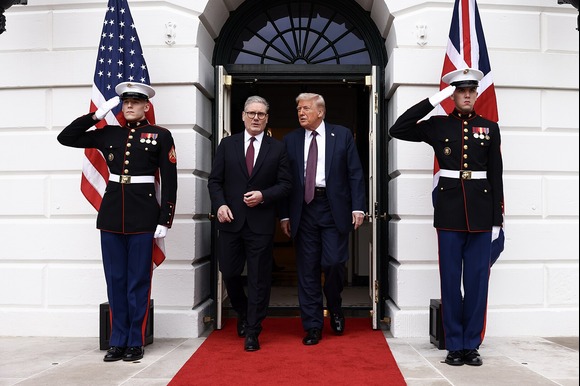Prime Minister Sir Keir Starmer is expected to press for an urgent ceasefire in Gaza during a high-profile meeting with US President Donald Trump in Scotland later today.
Sir Keir is travelling to Ayrshire for talks at Trump’s Turnberry golf resort, where discussions are likely to focus on escalating humanitarian concerns in Gaza, as well as trade. International pressure has been mounting over the worsening starvation crisis in the region, as aid agencies continue to warn of catastrophic shortages.
Previous negotiations aimed at securing a ceasefire and a hostage exchange, mediated in Qatar, collapsed earlier this week after the US and Israeli teams withdrew. This setback has intensified the urgency behind new diplomatic efforts.
The meeting between the UK prime minister and the US president comes as Israel faces increasing scrutiny from its allies. While Israel reported it dropped seven packages containing sugar, flour, and canned food into Gaza on Sunday morning—with the UAE, Jordan, and Egypt coordinating further land and air deliveries—humanitarian organisations argue that these efforts fall far short of meeting actual needs.
The World Health Organization has raised the alarm over “extremely high” levels of malnutrition in the territory, even as limited airdrops resumed. BBC News has learned that UK aircraft have not participated in these operations to date, and no aid provided by the UK government has yet been delivered through these channels.
On Monday morning, Israel began another temporary pause in military operations—lasting ten hours—in parts of Gaza to enable aid distribution. Amid growing concern at home, Sir Keir plans to convene a rare summer cabinet meeting this week despite Parliament being in recess, to address the unfolding humanitarian crisis and renew calls for a ceasefire between Israel and Hamas.
The government is working alongside Jordan to airdrop humanitarian supplies and has announced efforts to speed up the evacuation of critically ill children from Gaza to receive medical treatment in the UK.
Speaking to BBC Radio 4’s Today programme, Business Secretary Jonathan Reynolds described the situation in Gaza as “horrific,” stressing the UK’s responsibility to advocate for peace. He said the UK government is “deeply committed” to pushing progress in the peace process and reaffirmed the need for a two-state solution.
Reynolds added, “The US is the one actor that clearly has the leverage to affect both sides meaningfully. Their role in this moment is absolutely critical.”
Foreign Secretary David Lammy echoed this sentiment, stating that while airdrops can ease “the worst of the suffering,” only unrestricted access for aid convoys offers a sustainable solution. “Lorries remain the only viable way to deliver adequate aid,” Lammy said, urging Israel to remove barriers for ground access.
According to the Hamas-run health ministry in Gaza, at least 127 people have died from starvation since the war began. Israel imposed a full blockade on the enclave in March in an effort to compel Hamas to release hostages taken during the 7 October 2023 attacks. The blockade lasted 11 weeks before Israel began distributing aid again under the newly created Gaza Humanitarian Foundation (GHF)—a mechanism jointly backed by the US and Israel.
The GHF, however, has faced widespread criticism for placing civilians in danger. It requires people to travel through active conflict zones to a few designated pickup sites. The UN reports that over 1,000 Palestinians have died attempting to retrieve food from these locations. Israel defends the system, saying it prevents Hamas from seizing aid supplies, a claim Hamas strongly denies.
US President Trump, currently on a five-day trip to Scotland, accused Hamas last week of lacking seriousness in the Qatar ceasefire negotiations. Following the withdrawal of the US team from those talks, envoy Steve Witkoff stated: “Hamas does not appear to be co-ordinated or acting in good faith. We are now exploring other options to bring hostages home and restore stability in Gaza.”
Sir Keir is also facing growing domestic and international pressure to formally recognise a Palestinian state. French President Emmanuel Macron recently committed to recognising Palestinian statehood “within months,” and more than a third of UK MPs have signed a letter calling on the government to follow suit.
The Scottish National Party (SNP) has pledged to introduce a bill in September to force a parliamentary vote on the matter.
On Sunday, Conservative leader Kemi Badenoch said her party continues to back a two-state solution but insisted that now is not the right time to recognise a Palestinian state, warning it could be seen as “rewarding” Hamas following the group’s October attacks.
The current conflict began when Hamas launched a surprise assault on southern Israel on 7 October 2023, killing around 1,200 people and capturing 251 hostages. In response, the Israeli military initiated a large-scale campaign in Gaza. The death toll in the territory has since climbed to at least 59,676, according to figures from Gaza’s Hamas-controlled health ministry.
President Trump, who recently concluded talks with European Commission President Ursula von der Leyen resulting in a US-EU trade framework, is also due to meet Scotland’s First Minister John Swinney later today. Swinney confirmed that Gaza and trade will again be key discussion points.
Trump was “uniquely positioned” to influence Israel on improving humanitarian access, adding: “The international situation is causing deep unease, concern, and heartbreak here in Scotland—especially with regard to Gaza.”






